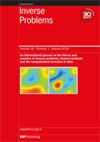用于逆 PDE 算子的伪微分积分自动编码器网络
IF 2
2区 数学
Q1 MATHEMATICS, APPLIED
引用次数: 0
摘要
偏微分方程(PDE)在物理现象建模中发挥着基础性作用。本研究解决了从测量数据中确定偏微分方程中可变系数这一具有挑战性的任务。我们引入了一种新型神经网络 "伪差分 IAEnet"(pd-IAEnet),它从伪差分算子中汲取灵感。与传统模型相比,pd-IAEnet 以更少的参数显著提高了计算速度和精度。在电阻抗层析成像、光学层析成像和地震成像等一系列逆问题上进行了广泛的基准评估,一致证明 pd-IAEnet 具有卓越的准确性。值得注意的是,pd-IAEnet 在存在测量噪声的情况下也表现出很强的鲁棒性,这是实际应用中的一个关键特性。它的一个突出特点是离散不变性,可以对来自不同离散方案的数据进行有效训练,同时保持不同网格的精度。总之,pd-IAEnet 为解决逆 PDE 问题提供了一个强大而高效的解决方案,有助于提高计算效率、鲁棒性和对各种数据源的适应性。本文章由计算机程序翻译,如有差异,请以英文原文为准。
Pseudo-differential integral autoencoder network for inverse PDE operators
Partial differential equations (PDEs) play a foundational role in modeling physical phenomena. This study addresses the challenging task of determining variable coefficients within PDEs from measurement data. We introduce a novel neural network, ‘pseudo-differential IAEnet’ (pd-IAEnet), which draws inspiration from pseudo-differential operators. pd-IAEnet achieves significantly enhanced computational speed and accuracy with fewer parameters compared to conventional models. Extensive benchmark evaluations are conducted across a range of inverse problems, including electrical impedance tomography, optical tomography, and seismic imaging, consistently demonstrating pd-IAEnet’s superior accuracy. Notably, pd-IAEnet exhibits robustness in the presence of measurement noise, a critical characteristic for real-world applications. An exceptional feature is its discretization invariance, enabling effective training on data from diverse discretization schemes while maintaining accuracy on different meshes. In summary, pd-IAEnet offers a potent and efficient solution for addressing inverse PDE problems, contributing to improved computational efficiency, robustness, and adaptability to a wide array of data sources.
求助全文
通过发布文献求助,成功后即可免费获取论文全文。
去求助
来源期刊

Inverse Problems
数学-物理:数学物理
CiteScore
4.40
自引率
14.30%
发文量
115
审稿时长
2.3 months
期刊介绍:
An interdisciplinary journal combining mathematical and experimental papers on inverse problems with theoretical, numerical and practical approaches to their solution.
As well as applied mathematicians, physical scientists and engineers, the readership includes those working in geophysics, radar, optics, biology, acoustics, communication theory, signal processing and imaging, among others.
The emphasis is on publishing original contributions to methods of solving mathematical, physical and applied problems. To be publishable in this journal, papers must meet the highest standards of scientific quality, contain significant and original new science and should present substantial advancement in the field. Due to the broad scope of the journal, we require that authors provide sufficient introductory material to appeal to the wide readership and that articles which are not explicitly applied include a discussion of possible applications.
 求助内容:
求助内容: 应助结果提醒方式:
应助结果提醒方式:


